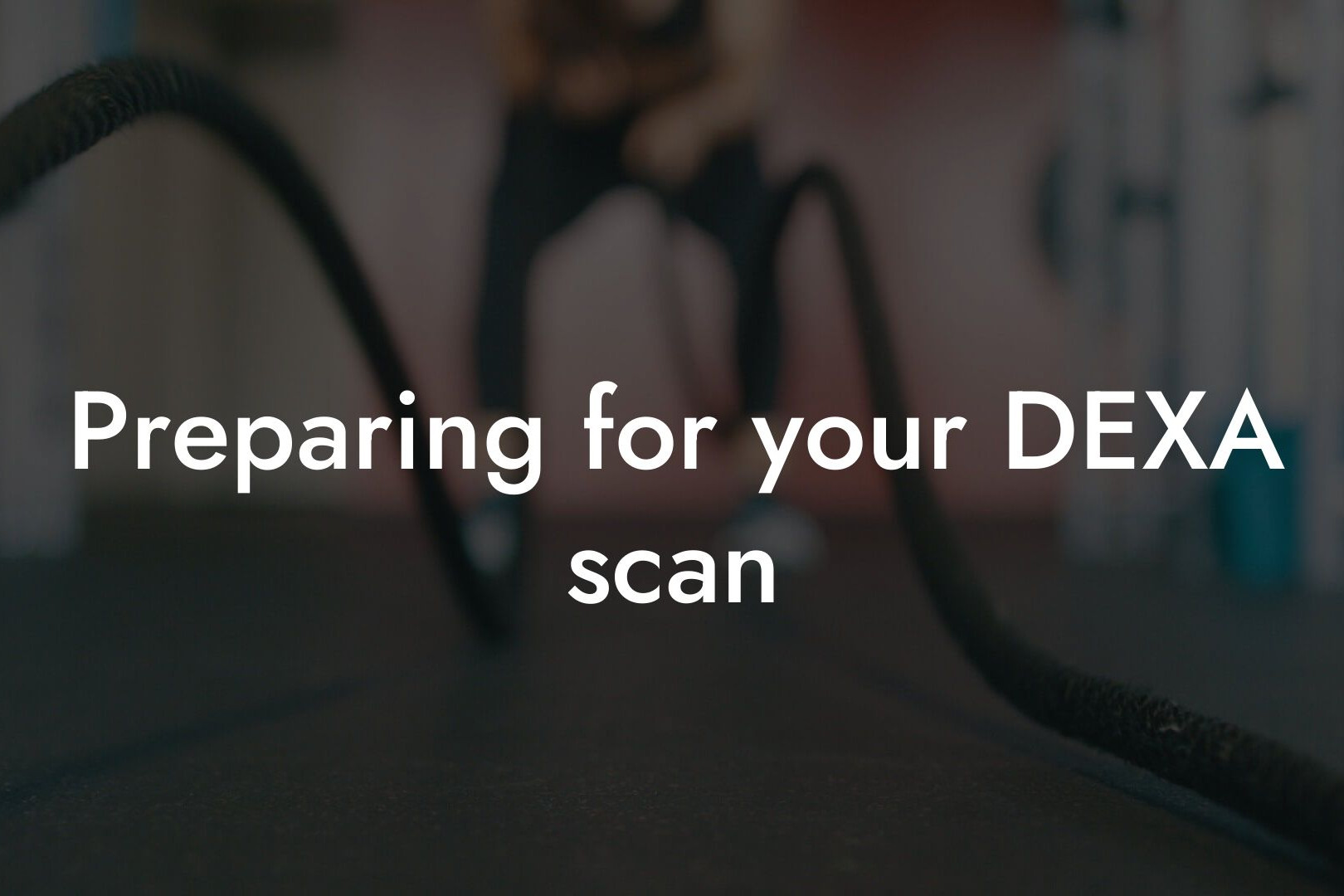As a high-earning professional interested in maintaining a healthy physique and optimal body composition, it's essential to stay on top of your body's metrics. One of the most effective ways to do this is by getting regular DEXA (Dual-Energy X-ray Absorptiometry) scans. But how often should you get a DEXA scan? In this article, we'll dive into the benefits of DEXA scanning, who should get scanned, and the recommended frequency for different individuals.
Table of Contents
What is a DEXA Scan?
A DEXA scan is a non-invasive, pain-free medical imaging test that measures bone density, body composition, and fat distribution. It's a valuable tool for tracking changes in your body over time, identifying potential health risks, and monitoring the effectiveness of your fitness and nutrition regimen. During a DEXA scan, you'll lie on a table while a machine passes over your body, emitting low-level X-rays that measure the density of your bones and soft tissues.
Benefits of Regular DEXA Scans
Regular DEXA scans offer numerous benefits for individuals looking to optimize their physical appearance and overall health. These benefits include:
- Accurate body fat percentage measurements
- Tracking changes in bone density and muscle mass
- Identifying areas of visceral fat accumulation
- Monitoring the effectiveness of your diet and exercise program
- Early detection of osteoporosis and other health risks
Who Should Get a DEXA Scan?
DEXA scans are beneficial for anyone looking to gain a deeper understanding of their body composition and bone health. However, certain individuals may benefit more from regular scanning, including:
- Athletes and fitness enthusiasts looking to optimize performance and body composition
- Individuals with a family history of osteoporosis or bone-related disorders
- Those with a history of fractures or osteopenia
- Men and women over 65 years old
- Individuals with a BMI above 30 or below 18.5
Recommended Frequency for DEXA Scans
The recommended frequency for DEXA scans varies depending on your individual needs and goals. Here are some general guidelines:
- Athletes and fitness enthusiasts: Every 6-12 months to track changes in body composition and muscle mass
- Individuals with a high risk of osteoporosis: Every 1-2 years to monitor bone density and detect early signs of osteoporosis
- Healthy adults: Every 2-5 years to track changes in body composition and bone density
- Individuals with a history of fractures or osteopenia: Every 1-2 years to monitor bone health and detect any changes
Factors Affecting DEXA Scan Frequency
Several factors can influence the recommended frequency for DEXA scans, including:
- Age: Older adults may require more frequent scans to monitor bone health and detect early signs of osteoporosis
- Health status: Individuals with underlying health conditions, such as osteoporosis or diabetes, may require more frequent scans
- Medications: Certain medications, such as corticosteroids, can affect bone density and may require more frequent scans
- Lifestyle changes: Significant changes in diet, exercise, or lifestyle may warrant more frequent scans to track changes in body composition and bone density
What to Expect During a DEXA Scan
During a DEXA scan, you'll typically lie on a table while a machine passes over your body, emitting low-level X-rays. The scan itself takes around 10-15 minutes, and you'll be asked to:
- Remove any metal objects, such as jewelry or glasses
- Wear loose, comfortable clothing
- Avoid eating or drinking for a few hours before the scan
- Hold still during the scan to ensure accurate results
Interpreting DEXA Scan Results
After the scan, a healthcare professional will review your results and provide you with a detailed report. This report will typically include:
- Bone density measurements (T-score and Z-score)
- Body fat percentage and distribution
- Muscle mass and lean body mass measurements
- Visceral fat area and ratio
Regular DEXA scans are an essential tool for individuals looking to optimize their physical appearance, body composition, and overall health. By understanding how often to get a DEXA scan, you can take control of your health and make data-driven decisions to achieve your goals. Remember to consult with a healthcare professional to determine the best scanning frequency for your individual needs.
Frequently Asked Questions
What is a DEXA scan?
A DEXA (Dual-Energy X-ray Absorptiometry) scan is a non-invasive medical test that measures bone density and body composition. It's commonly used to diagnose osteoporosis, track bone loss, and monitor the effectiveness of osteoporosis treatment. Additionally, DEXA scans can also provide information on body fat percentage, lean mass, and visceral fat area.
Why is it important to get a DEXA scan?
Getting a DEXA scan is important because it can help identify potential health risks, such as osteoporosis, before they become severe. It can also provide valuable insights into body composition, allowing you to make informed decisions about your diet and exercise routine. Furthermore, regular DEXA scans can help track progress and ensure that your fitness efforts are yielding the desired results.
How often should I get a DEXA scan?
The frequency of DEXA scans depends on various factors, including age, health status, and fitness goals. Generally, healthy adults may need a DEXA scan every 2-5 years, while individuals with a higher risk of osteoporosis or those undergoing treatment may require more frequent scans. It's best to consult with a healthcare professional to determine the ideal scanning schedule for your individual needs.
What are the benefits of regular DEXA scans?
Regular DEXA scans can provide numerous benefits, including early detection of osteoporosis, tracking of bone density changes, and monitoring of body composition. This information can help you make informed decisions about your diet, exercise, and supplementation, leading to improved overall health and physique.
Can I get a DEXA scan if I'm under 30?
While DEXA scans are commonly associated with older adults, individuals under 30 can also benefit from scanning. If you're an athlete or have a high-risk profession, a DEXA scan can provide valuable insights into your body composition and bone density. Additionally, if you have a family history of osteoporosis or other risk factors, a DEXA scan may be recommended.
Is a DEXA scan painful or invasive?
No, a DEXA scan is a non-invasive and painless procedure. You'll lie on a table, and a scanner will pass over your body, taking X-ray images of your bones and body composition. The entire process typically takes around 10-15 minutes.
How long does it take to get the results of a DEXA scan?
The results of a DEXA scan are usually available within a few days to a week after the scan. Your healthcare provider will review the results with you, explaining what they mean and providing recommendations for your health and fitness journey.
Can I get a DEXA scan if I'm pregnant or breastfeeding?
It's generally recommended to avoid DEXA scans during pregnancy and breastfeeding, as the radiation exposure, although minimal, may pose a risk to the developing fetus or baby. However, if your healthcare provider deems it necessary, they may recommend a DEXA scan with proper precautions and shielding.
How much does a DEXA scan cost?
The cost of a DEXA scan varies depending on the location, healthcare provider, and insurance coverage. On average, the cost ranges from $100 to $300. It's essential to check with your insurance provider to see if they cover DEXA scans and what the out-of-pocket costs may be.
What should I wear to a DEXA scan?
Wear loose, comfortable clothing without metal fasteners, zippers, or other objects that may interfere with the scan. You may be asked to remove any jewelry, glasses, or other metal objects before the scan.
Can I eat or drink before a DEXA scan?
There are no specific dietary restrictions before a DEXA scan. However, it's recommended to avoid eating a heavy meal or consuming caffeine immediately before the scan, as this may cause discomfort or affect the accuracy of the results.
How does a DEXA scan work?
A DEXA scan uses low-level X-rays to measure the density of your bones and body composition. The scanner emits two X-ray beams with different energy levels, which pass through your body. The absorption of these beams is measured, providing a detailed picture of your bone density and body composition.
What are the risks associated with DEXA scans?
The risks associated with DEXA scans are minimal. You'll be exposed to a small amount of radiation, which is equivalent to a few days of natural background radiation. Additionally, some people may experience claustrophobia or discomfort during the scan, but this is rare.
Can I get a DEXA scan if I have metal implants?
If you have metal implants, such as hip or knee replacements, you may still be able to get a DEXA scan. However, you should inform your healthcare provider about the implant, as it may affect the accuracy of the results or require special accommodations during the scan.
How does a DEXA scan measure body fat percentage?
A DEXA scan measures body fat percentage by using the X-ray beams to distinguish between different tissue types, including fat, lean mass, and bone. The scan provides a detailed breakdown of your body composition, including visceral fat area, lean mass, and bone density.
Can I use a DEXA scan to track my progress?
Yes, DEXA scans are an excellent way to track your progress over time. By comparing the results of multiple scans, you can see changes in your bone density, body fat percentage, and lean mass, helping you adjust your diet and exercise routine accordingly.
What are the limitations of DEXA scans?
While DEXA scans are highly effective, they do have some limitations. They may not be accurate for individuals with a high degree of muscle mass or those with certain medical conditions, such as osteogenesis imperfecta. Additionally, DEXA scans may not provide information on muscle quality or function.
Can I get a DEXA scan if I have a pacemaker or implantable cardioverter-defibrillator (ICD)?
If you have a pacemaker or ICD, you should consult with your healthcare provider before getting a DEXA scan. While the scan itself is safe, the strong magnetic fields may interfere with the device's function.
How does a DEXA scan differ from a bone density test?
A DEXA scan is a type of bone density test, but it provides more comprehensive information on body composition, including lean mass, fat mass, and visceral fat area. Other bone density tests, such as quantitative computed tomography (QCT) or peripheral dual-energy X-ray absorptiometry (pDXA), may only measure bone density.
Can I get a DEXA scan at my primary care physician's office?
Some primary care physicians may offer DEXA scans in their office, but it's more common to have the scan performed at a specialized imaging center or hospital. Your healthcare provider can recommend a facility or schedule the scan for you.
What should I do if I'm concerned about my DEXA scan results?
If you're concerned about your DEXA scan results, discuss them with your healthcare provider. They can help you understand the results, address any concerns, and develop a plan to improve your bone density and overall health.
Can I use a DEXA scan to monitor my osteoporosis treatment?
Yes, DEXA scans are an essential tool for monitoring osteoporosis treatment. By tracking changes in bone density over time, you and your healthcare provider can determine the effectiveness of your treatment and make adjustments as needed.
Here are some related articles you might love...
- Preparing for your DEXA scan
- Benefits of DEXA scans for professionals
- DEXA scans for athletes vs general population
- What is a DEXA scan?
- Understanding DEXA scan results
- How DEXA scans measure body fat
- DEXA scan vs other body composition tests (e.g., BMI, calipers)
- Cost of a DEXA scan: Is it worth it?
- Accuracy of DEXA scans
Zak Faulkner
Zak Faulkner is a leading authority in the realm of physical health and body composition analysis, with over 15 years of experience helping professionals optimise their fitness and well-being. As one the experts behind Tano Performance Group, Zak has dedicated his career to providing in-depth, science-backed insights that empower clients to elevate their physical performance and overall health.
With extensive knowledge of DEXA technology, Zak specializes in delivering comprehensive body assessments that offer precise data on body fat, muscle mass, bone density, and overall physique. His expertise enables individuals to make informed decisions and achieve their fitness goals with accuracy and confidence. Zak’s approach is rooted in a deep understanding of human physiology, combined with a passion for helping clients unlock their full potential through personalised strategies.
Over the years, Zak has earned a reputation for his commitment to excellence, precision, and client-focused service. His guidance is trusted by top professionals who demand the best when it comes to their health. Whether advising on fitness programs, nutritional strategies, or long-term wellness plans, Zak Faulkner’s insights are a valuable resource for anyone serious about taking their health and fitness to the next level.
At Tano Performance Group, Zak continues to lead our Content Team revolutionising how professionals approach their physical health, offering unparalleled expertise that drives real results.




